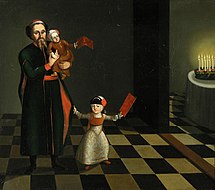Kislev
Appearance
| Kislev | |
|---|---|
 Hanukkah, the Festival of Lights, begins on the 25th of Kislev. | |
| Native name | כִּסְלֵו (Hebrew) |
| Calendar | Hebrew calendar |
| Month number | 9 |
| Number of days | 29 or 30 |
| Season | Autumn (Northern Hemisphere) |
| Gregorian equivalent | November–December |
| Significant days | Hanukkah |
Kislev or Chislev (Hebrew: כִּסְלֵו, Standard Kīslev Tiberian Kīslēw),[1] is the third month of the civil year and the ninth month of the ecclesiastical year on the Hebrew calendar. In the Babylonian calendar its name was Kislimu.
In a regular (kesidran) year Kislev has 30 days, but because of the Rosh Hashanah postponement rules, in some years it can lose a day to make the year a "short" (chaser) year. Kislev is a month which occurs in November–December on the Gregorian calendar and is sometimes known as the month of dreams.
In Jewish Rabbinic literature, the month of Kislev is believed to correspond to the Tribe of Benjamin.[2]
Holidays
[edit]25 Kislev – 2 Tevet – Hanukkah – ends 3 Tevet if Kislev is short
In Jewish history and tradition
[edit]- 1 Kislev (1977) – Rabbi Menachem Mendel Schneerson miraculously recovered from a devastating heart attack.
- 6 Kislev (1973) – Death of David Ben-Gurion
- 8 Kislev (1978) – Death of Golda Meir
- 9 Kislev (1773) – Birth of the Mitteler Rebbe, the second Chabad Rebbe.
- 9 Kislev (1827) – Death of the Mitteler Rebbe, the second Chabad Rebbe.
- 10 Kislev (1826) – Liberation from prison of the Mitteler Rebbe, the second Chabad Rebbe.
- 14 Kislev (c. 1445 BCE) – Death of Reuben, son of Jacob.[3]
- 14 Kislev (c. 1568 BCE) – Birth of Reuben, son of Jacob.[3]
- 14 Kislev (1929) - Rabbi Menachem Mendel Schneersohn married Chaya Mushka Schneersohn, the daughter of the Sixth Lubavitcher Rebbe
- 15 Kislev (167 BCE) – The Greeks set up the "Abomination of Desolation" in the Temple.[4]
- 17 Kislev (1947) – The United Nations General Assembly approves a plan for the partition of Palestine, which eventually led to the creation of the State of Israel.
- 19 Kislev (1772) - Death of the Magid Of Mezritch, successor of the Baal Shem Tov.
- 19 Kislev (1798) – Liberation from prison of Rabbi Shneur Zalman of Liadi and celebrated as Yud Tes Kislev by Chabad Chassidim.
- 20 Kislev (c. 457 BCE) – Ezra addresses a three-day assemblage of Jews in Jerusalem, telling them to adhere to the Torah and to dissolve their interfaith marriages.
- 21 Kislev (c. 128 BCE) – The Samaritan temple at Mount Gerizim was destroyed by John Hyrcanus I.[5]
- 25 Kislev (164 BCE) – The Hanukkah miracle
- 25 Kislev (167 BCE) The Greeks make pagan sacrifices in the Temple[6]
- 27 Kislev (c. 2105 BCE) – Flood rains cease (According to Genesis 6–8).
References in fiction
[edit]- In the story of Xenogears, Kislev is the name of a country, named after the Hebrew month.
- In the Warhammer universe, Kislev is both the name for a city near the chaos wastes and the country in which it resides. Kislev is modelled after a combination of 16th century Russia and Poland-Lithuania.
- In the Dragonlance universe, Kislev (or Chislev) represents the godly force of instinct.
- By Jon Stewart in "Can I Interest You in Hanukkah" from Stephen Colbert's A Colbert Christmas: The Greatest Gift of All!
See also
[edit]References
[edit]- ^ "Chislev". Webster's Revised Unabridged Dictionary. The Free Dictionary (Farlex). 1913. Retrieved 2011-02-07.
- ^ "Rosh Chodesh Kislev • Torah.org". torah.org. March 2016.
- ^ a b Hamodia. Nov/28/12. p. D47.
- ^ "Now the fifteenth day of the month Kislev, in the hundred forty and fifth year, they set up the abomination of desolation upon the altar, and builded idol altars throughout the cities of Judah on every side." (1 Maccabees 1:54)
- ^ Megillat Ta'anit 29
- ^ "Now the five and twentieth day of the month they did sacrifice upon the idol altar, which was upon the altar of God." (1 Maccabees 1:59)
